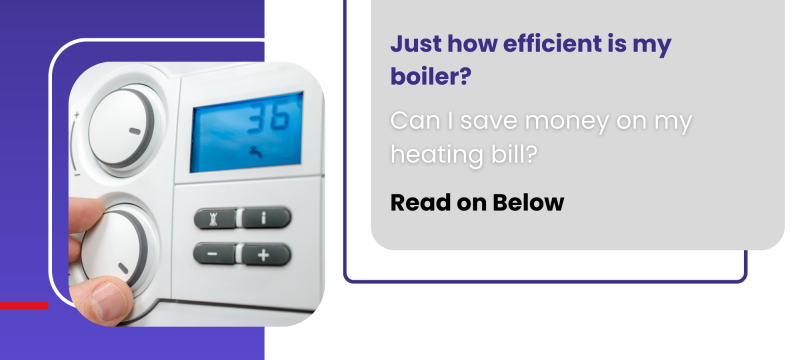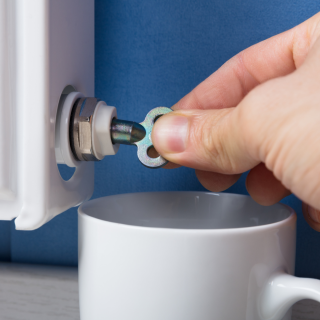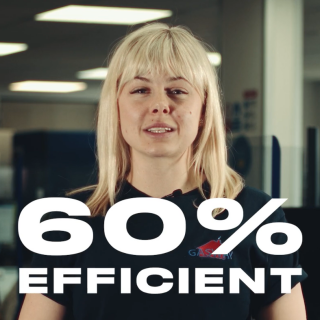Just how efficient is my boiler?
Can I save money on my heating bill?

Are you wondering how efficient your gas boiler is?
Perhaps you're considering upgrading to a new boiler, but you're not sure if it's worth the investment. Read on to explore the ins and outs of boiler energy efficiency. Including; how it's measured, and why it matters. We'll also cover the benefits of upgrading to a new, more energy-efficient boiler and how to maximize the efficiency of your current system.
What Does Boiler Efficiency Mean?
Understanding Boiler Energy Ratings
Boiler efficiency refers to how well your boiler converts energy from fuel into heat. The higher the efficiency, the less energy is wasted. Boilers are rated using the Seasonal Efficiency of Domestic Boilers in the UK (SEDBUK) system, which classifies efficiency as a percentage. A 90% efficient boiler converts 90% of fuel into heat, with only 10% wasted.
How Efficiency Impacts Your Heating Bills
The efficiency of your boiler has a direct impact on your heating bills. An inefficient boiler consumes more fuel to produce the same amount of heat, leading to higher costs. For example if your boiler is only 90% efficient for every £1 you spend on heating only 90p is actually turned into heat.
Upgrading to a high-efficiency boiler could save you hundreds of pounds annually, depending on your heating requirements.
The Role of Boiler Age in Efficiency
Older boilers tend to have lower efficiency ratings. While a new condensing boiler can achieve efficiency ratings of over 90%, older models, particularly non-condensing ones, may only achieve 60–70%. This means up to 40% of the fuel you pay for is wasted as heat or emissions.
This could mean that just under half of the cost your spend on your annual heating bill us unnecessary.
Types of Boilers and Their Efficiency Levels

Condensing vs. Non-Condensing Boilers
Condensing boilers are designed to recover heat from exhaust gases, making them significantly more efficient than non-condensing models. In fact, condensing boilers are often required by UK law for new installations, as they boast efficiency ratings above 90%.
How Combi Boilers Compare to System Boilers
Combi boilers provide hot water on demand without the need for a storage tank, making them a space-saving option for smaller homes. They are generally very efficient, but in larger households with high hot water demand, a system boiler with a hot water cylinder may be a better fit.
Are Electric Boilers More Efficient Than Gas Boilers?
Electric boilers can achieve near 100% efficiency because they convert almost all the energy they consume into heat. However, electricity costs are often higher than gas, making them a less economical choice for many households. Unless of course you have solar panels and battery storage installed in your home, then these can be a great option.
Not sure what type of boiler you have? You can find out here!
How to Check Your Boiler's Efficiency
Using the Seasonal Efficiency of Domestic Boilers (SEDBUK) Rating
The SEDBUK rating is a standardised way of comparing boiler efficiency. Modern boilers typically have an A-rating, meaning they achieve 90% or higher efficiency. Check your boiler’s manual or label for its SEDBUK rating. If you can't find the specific paper manual you would have received when your boiler was installed you can also look at your manual online.
Signs Your Boiler Might Be Losing Efficiency
If your energy bills are rising unexpectedly or your home takes longer to heat, your boiler may be losing efficiency. Other signs include unusual noises, inconsistent heating, or the need for frequent repairs. We highly recommend receiving an annual service, to make sure your heating system is running as it should be.
Tools and Methods to Measure Efficiency at Home
You can use a flue gas analyser to check your boiler’s combustion efficiency, this is quite a specialist piece of equipment and you are unlikely to have one at home. Alternatively, hire a professional engineer to perform an efficiency test as part of a routine service.

Improving Your Boiler’s Efficiency
Regular Maintenance and Servicing Tips
Scheduling annual boiler services is crucial for maintaining efficiency. A qualified engineer can clean components, check for wear and tear, and optimise performance. Regular servicing can add years to your boiler’s lifespan.
Upgrading to a Smart Thermostat for Better Control
A smart thermostat allows you to control your heating more precisely, preventing unnecessary energy use. Features like remote access and learning algorithms help you create an efficient heating schedule tailored to your lifestyle.
The Importance of Bleeding Your Radiators
Trapped air in radiators can reduce heating efficiency, forcing your boiler to work harder. Bleeding your radiators removes this air, improving heat distribution and reducing energy waste. You can do this at home by yourself fairly easily, all you will need is a radiator key.
How to Bleed your radiators

You will need a few things, a radiator key, and a container and a cloth to catch water.
The image below indicates that you could use a cup. If you bleed your radiators regularly this is possible to do, otherwise, use a larger container.
- Turn off your heating. You can’t bleed a radiator when the heating is on, as unsafe, and you may get pressurised water spraying from your system.
- Use a radiator key to turn the valve at the top of the radiator. Attach the key to the square groove in the centre of the valve as shown in the diagram and turn it slowly anticlockwise. You should hear a hissing sound. This is the trapped air escaping.
- Retighten the valve once the hissing stops and only liquid comes out. Do this quickly to stop too much water from escaping. If you find lots of water escaping use a bucket or cloth to soak it up.
- Turn your central heating system back on.
- Check the pressure by looking at the gauge on your boiler. Bleeding your radiators can cause the pressure to drop. If the pressure is too low, you’ll need to top it up. Use the filling loops as described to repressurise your boiler.
- Check your system if the heat is evenly spread through the radiator, you’ve fixed the problem.
When to Replace Your Boiler for Maximum Efficiency

Red Flags That Indicate It’s Time for a New Boiler
If your boiler is over 15 years old, needs frequent repairs, or has an efficiency rating below 70%, it may be time for a replacement. Investing in a new high-efficiency model can provide long-term savings. We have another article explaining exactly what happens during a boiler installation.
How Modern Boilers Outperform Older Models
Modern condensing boilers use advanced technology to capture and reuse heat that would otherwise be wasted. This not only improves efficiency but also reduces greenhouse gas emissions.
Government Schemes and Rebates for Upgrading
The UK government offers incentives such as the Boiler Upgrade Scheme to encourage homeowners to switch to energy-efficient carbon-neutral heating systems. The most popular system fitted under this scheme is an Air Source Heat Pump. Air Source Heat Pumps can be 4x more efficient compared to gas boilers, comparatively, this means for every £1 spent you receive four times more heat than you would with a regular gas boiler.
Many Home Owners are Switching to Air Source Heat Pumps.
Save £7500 on an Air Source Heat Pump Install with the BUS Voucher.
Environmental and Financial Benefits of an Efficient Boiler
Reducing Your Carbon Footprint with a High-Efficiency Boiler
An efficient boiler consumes less fuel, reducing the amount of carbon dioxide released into the atmosphere. Upgrading to a high-efficiency model can make a substantial difference in lowering your household’s environmental impact.
Alternatively, switching to an Air Source Heat Pump, releases no further carbon into the air, reducing your carbon footprint drastically.
How an Efficient Boiler Saves You Money Over Time
While the initial cost of a new boiler can be significant, the energy savings often offset this expense within a few years. Efficient boilers can cut heating costs by up to 30%, providing a strong return on investment.
You can typically see a return on this investment within 5 years, however this is dependent on how regularly you may have swapped or upgraded your heating system.
The Role of Energy-Efficient Boilers in a Greener Future
Switching to an energy-efficient boiler aligns with broader sustainability goals, contributing to a more sustainable energy grid and a cleaner environment. As the UK aims to achieve net-zero emissions by 2050, efficient boilers are an essential part of the solution.
Frequently Asked Questions About Boiler Efficiency
Conclusion: Maximise Efficiency and Minimise Costs
Your boiler’s efficiency has a significant impact on both your wallet and the environment. By understanding efficiency ratings, maintaining your boiler, and upgrading when necessary, you can enjoy a warmer home, lower energy bills, and a greener future.
If you’re ready to improve your home’s heating system, consider consulting a professional for tailored advice on boiler efficiency and installation. It’s an investment that pays off in comfort, savings, and sustainability.

Sam Teal - Marketing Manager:
Just how efficient is my boiler? (5th of December 2024)
Sam is a seasoned writer, blending expertise in marketing, psychology, and emerging technologies.
With a keen understanding of consumer behaviour, Sam strives to make the heating industry greener and more sustainable. His diverse portfolio includes articles spanning multiple industries, including entertainment, board games, tech and of course the heating industry.
With a passion for change and innovation, Sam is one of many industry experts at Gasway Services LTD.
LinkedIn Instagram

